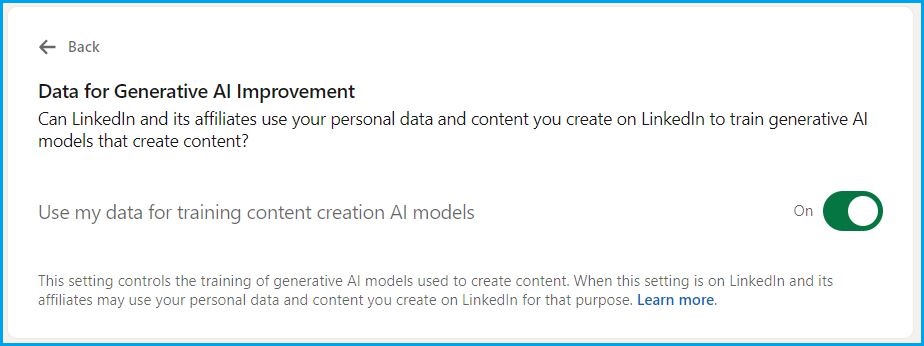LinkedIn has reportedly been discovered collecting user data to train its artificial intelligence systems before alerting users to the change in the platform’s terms of service.
The Microsoft-owned, work-focussed social media network reportedly told 404 Media it would update its policies “shortly”, after some frustrated users noticed that a toggle allowing data collection for AI training was switched on by default.
LinkedIn has since updated its terms of service — and unlike Meta’s treatment of public accounts — LinkedIn users in Australia can opt out of their data being used.
But the company has made it clear that opting out “does not affect [AI] training that has already taken place”.
Here’s what you need to know.
How Australians can opt out of LinkedIn AI training
In its updated privacy policy which came into effect on 18 September 2024, LinkedIn said it may use member data to train its generative AI models, which allowed things such as generating writing suggestions on the platform, among other things.
The company also said its generative AI features may be trained by other providers, including Microsoft’s Azure OpenAI service.
To opt out of LinkedIn's AI training, users will need to access the data for generative AI improvement setting, which is switched on by default and looks like this:
Image: LinkedIn
If you are using the LinkedIn mobile app, you can access this setting by tapping on your profile picture and then Settings in the bottom-left corner.
If you then tap on “Data privacy”, you should see the setting to turn off “data for generative AI improvement”.
LinkedIn added that users could also “object to the use of their personal data for training non-content generating GAI models" by using this separate data processing objection form.
“Opting out means that LinkedIn and its affiliates won’t use your personal data or content on LinkedIn to train models going forward, but does not affect training that has already taken place,” LinkedIn said.
“Where LinkedIn trains generative AI models, we seek to minimise personal data in the data sets used to train the models, including by using privacy enhancing technologies to redact or remove personal data from the training dataset."
LinkedIn was contacted for comment as to whether user data was used to train AI before its terms of service were updated, as well as why AI training was switched on by default.
A post about LinkedIn's policy changes on the company's own LinkedIn page had its comments turned off, despite a majority of its earlier posts allowing comments.
In February 2023, LinkedIn’s Blake Lawit and Ya Xu wrote that the company’s Responsible AI Principles included a goal to provide transparency around the firm's use of the technology.
“We seek to explain in clear and simple ways how our use of AI impacts people,” they said at the time.
Some countries protected from LinkedIn AI training
Lawit, a senior vice president and general counsel at LinkedIn, said on Thursday that the company was not training its AI systems using data from users in Switzerland or the 30 members of the European Economic Area (EEA), which includes 27 EU member states, as well as Iceland, Liechtenstein, and Norway.
These nations have stronger privacy laws than what has so far been enacted in Australia, with EU nations protected by the bloc’s General Data Protection Regulation (GDPR).

LinkedIn says the data of users in Switzerland or the European Economic Area is not currently used for AI training. Photo: Shutterstock
In other countries, LinkedIn would allow users to opt-out, Lawit said in a statement.
“As technology and our business evolves, and the world of work changes, we remain committed to providing clarity about our practices and keeping you in control of the information you entrust with us,” he said.
Ireland’s Data Protection Commissionn (DPC), which oversees compliance with the EU’s GDPR, reportedly told TechCrunch that it was informed by LinkedIn last week that the company had planned changes to its global privacy policy.
It comes after Meta —which owns Facebook, Instagram, Threads, and WhatsApp — recently reiterated that Australians were not able to opt out of having public posts on its platforms used to train its own generative AI products.
Meta has paused launching its AI products in the EU due to the GDPR.
Popular communications platform Slack also experienced an outcry from users in May this year when it defended using customer data to develop some of its AI models.
Users also needed to take action to opt out of the AI training in that case.
The Australian government has introduced long-awaited reforms to the country's Privacy Act, but some experts have warned of continued deficiencies and called for greater privacy protections.











